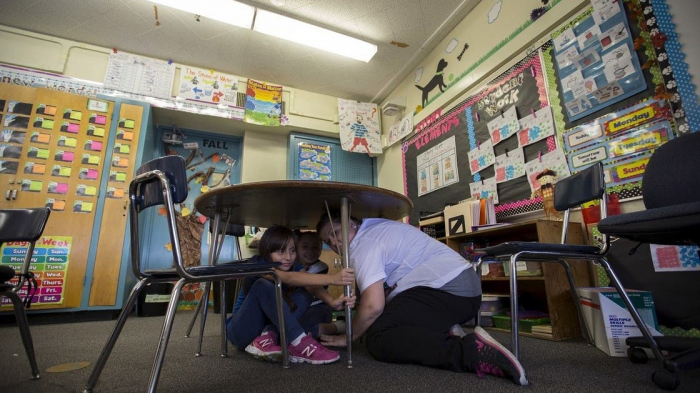You may be wondering how earthquakes happen?
When the plates rub against each other or move apart, the sudden release of energy causes seismic waves that radiate outward from the point of origin, creating the shaking and vibration known as an earthquake. Earthquakes can range in intensity from barely noticeable tremors to catastrophic events that can cause widespread destruction and loss of life.
How are earthquakes measured?
There are two ways by which the strength of an earthquake can be measured: magnitude and intensity. Magnitude is the energy released by the epicenter during an earthquake. It is calculated from earthquakes recorded by a special instrument called a Seismograph. Intensity, on the other hand, is the intensity of an earthquake perceived and felt by people in a particular location. It is a numerical rating based on the relative impact on people, objects, surrounding structures and the environment. The intensity is usually higher near the epicenter.
How to stay safe during an earthquake?
The first thing we need to learn is to remember three words; Drop, Cover and Hold on! In most cases, you can protect yourself from harm if you immediately Drop, Cover, and Hold on.
● Drop down onto your knees and hands before an earthquake knocks you off your feet. This position protects you from falling but allows you to move when needed.
● Cover your head and neck and get under a strong desk or table. If there is no shelter near you, get down against an interior wall or near low furniture that won't fall on you, and cover your head and neck with your arms.
● Hold on to the shelter (or head and neck) until the shaking stops. Be prepared to move your shelter if the shaking moves it and affects your safety.
Do not go outside or to other rooms
Do not go outside or to other rooms during an earthquake.
You are more likely to be safe if you stay where you are. Do the following to minimize the risk of injury:
● If possible, stay away from glass, hanging objects, shelves, bookcases, dressers, and other large furniture that could fall if the shaking intensifies. Watch out for falling objects such as fireplace bricks, light fixtures, high shelves, and cabinets with opening doors.
● If there is something that you can use nearby, take it with you to protect your head and face from falling debris and broken glass.
● If you’re in the kitchen, turn off the stove quickly and cover yourself at the first sign of shaking.
● If you are lying in bed, hold on tight and stay there and cover your head with a pillow. You’re less likely to get hurt if you stay put. Broken glass on the floor can cause injury if you step on or roll on the floor.
If you are in a high-rise building also drop, cover, and hold on.
● Stay in the building.
● Stay away from windows and outside walls.
● Avoid using the elevators at all costs, because both the sprinkler systems and the electricity could fail.
● Stay calm if you find yourself trapped. Try to get someone’s attention by knocking on hard parts of the structure or on any metal. Doing so may increase your chances of being noticed and rescued.
If you are in a crowded place, remember to drop, cover, and hold on.
● Do not run towards the doorways. Others will certainly have the same idea.
● Get away from any display shelves that hold objects that can fall.
● If it’s possible, take cover and grab something to shield your head and face.
If you are outside, stay there!
● Avoid standing near buildings, power cables, and gas stations. The greatest danger from falling debris occurs just outside doorways and near the exterior walls of buildings.
● Get away to a vast area distant from buildings, telephone and electricity poles, and trees. Once you find yourself in the open, get down low and stay still until the shaking stops.
If you are driving, stop as swiftly and safely as possible.
● Move your car to the shoulders or curbs, away from poles and wires.
● Stay inside the car and apply the parking brakes, it’s a good place to stay until the shaking stops.
● Turn on the radio to listen to emergency broadcast information.
● If a power line falls on your car, stay inside until a professionally trained person removes the wires.
If you cannot drop to the ground, try to remain seated in order not to fall.
● Lock the wheels. If you’re a wheelchair user. Remove everything that is not firmly fastened to the wheelchair.
● Shield your head and neck using a large book, pillow or your arms. The goal is to prevent injuries.
● If you are able, shelter yourself under a sturdy desk or table. Stay away from outer walls, windows, fireplaces, and hanging and falling objects.
● If you are incapable of moving from a bed or a chair, protect yourself from falling objects by covering yourself up with blankets and pillows.
Are earthquakes increasing?
A quick look at earthquake statistics over the last twenty years shows that earthquakes aren’t increasing. On average there are about fifteen earthquakes with a magnitude of 7 or greater every year. The number of earthquakes each year varies slightly from this average, but in general, there are no dramatic changes.
Al Arabiya
More about:
















































